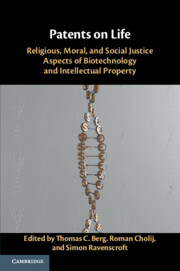 Patents on Life
Patents on Life from I - Life Patents, Law, and Morality
Published online by Cambridge University Press: 28 September 2019
Exclusions from patentable subject matter eligibility for scientific and natural discoveries and for abstract ideas were justified historically on religious, deontological and utilitarian moral grounds. This chapter briefly traces the history of such exclusions derived from the United Kingdom and transplanted to the United States. It then explains why such discoveries were to be treated in the United States as prior art against the applicant. Consequently, in order to claim a patent eligible “invention,” an applicant had to do more than merely apply his scientific, natural, or abstract discovery for practical benefit. Rather, the creative advance had to be in the application itself, rather than in the discovery it applied. This approach differs from that adopted in the United Kingdom and in Europe. The chapter concludes by discussing why the line between discovery and patent eligible invention matters morally and practically and will continue to be contested.
To save this book to your Kindle, first ensure no-reply@cambridge.org is added to your Approved Personal Document E-mail List under your Personal Document Settings on the Manage Your Content and Devices page of your Amazon account. Then enter the ‘name’ part of your Kindle email address below. Find out more about saving to your Kindle.
Note you can select to save to either the @free.kindle.com or @kindle.com variations. ‘@free.kindle.com’ emails are free but can only be saved to your device when it is connected to wi-fi. ‘@kindle.com’ emails can be delivered even when you are not connected to wi-fi, but note that service fees apply.
Find out more about the Kindle Personal Document Service.
To save content items to your account, please confirm that you agree to abide by our usage policies. If this is the first time you use this feature, you will be asked to authorise Cambridge Core to connect with your account. Find out more about saving content to Dropbox.
To save content items to your account, please confirm that you agree to abide by our usage policies. If this is the first time you use this feature, you will be asked to authorise Cambridge Core to connect with your account. Find out more about saving content to Google Drive.